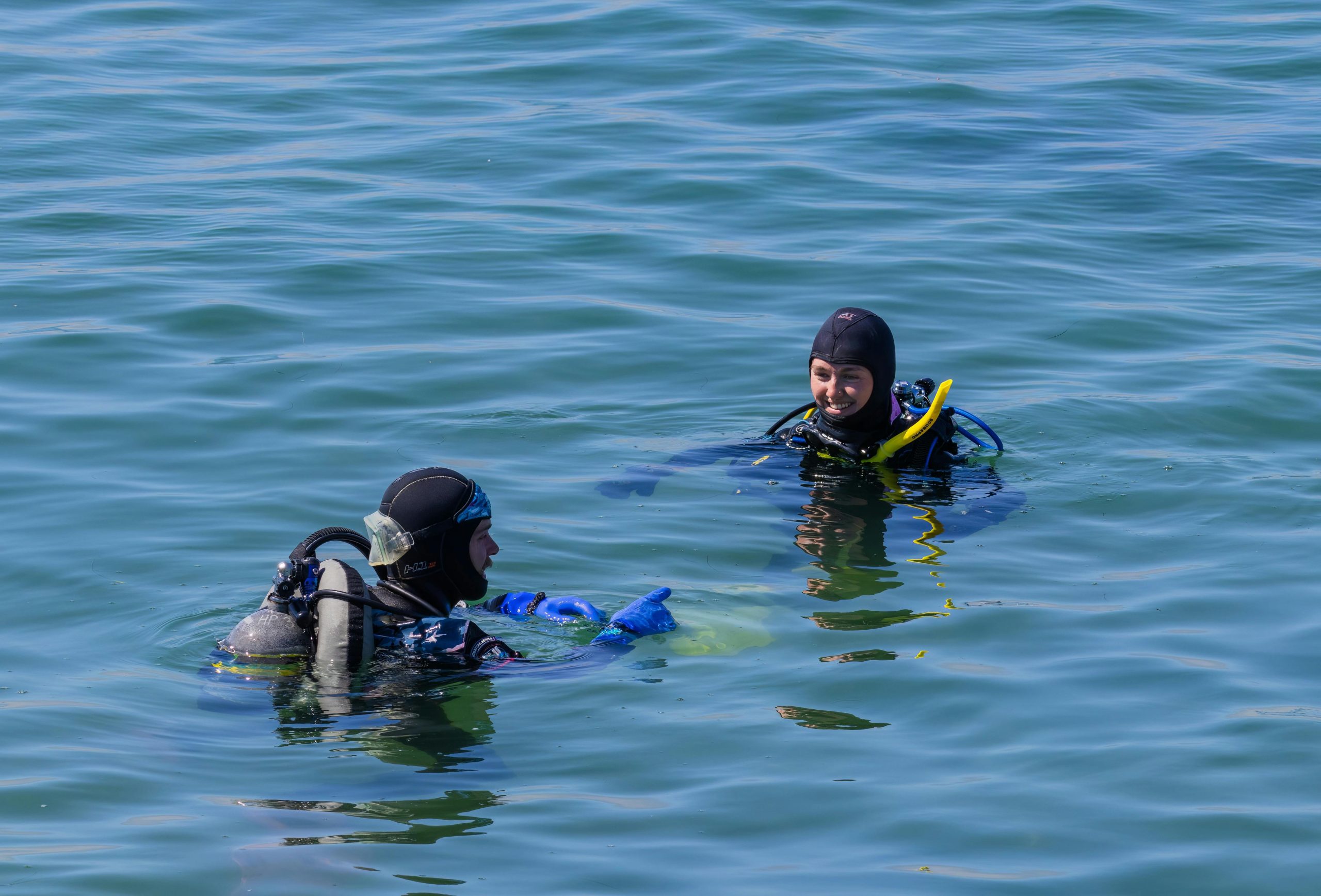
Scuba diving was invented by the great French ocean explorer Jacques Yves Cousteau as a means to study the undersea world more closely from his research vessel Calypso. His amazing Self Contained Underwater Breathing Apparatus allowed divers much greater freedom of movement than the bulky old surface air hose suits did, while allowing humans to range deeper and stay longer than traditional freediving allowed. He didn’t realize he was starting a revolution in water sports that would reach far beyond science!
Nowadays this underwater adventure sport is practised by millions of people all over this big blue planet! You can learn to scuba dive almost anywhere, and many people make it a part of their holiday, for example taking scuba diving for beginners in Maldives course so they can get the most out of the gorgeous tropical seas that surround them! Let’s learn a little about what’s involved!
The instructor begins by helping the students learn the breathing rules and equalization techniques. Once those have been mastered, the equipment’s purpose and use is studied, and hand signals, regulator and mask-clearing techniques, and responsible interactions with aquatic life are taught.
Essential Travel Resources
❗Don’t forget travel insurance
This company is the one I trust, it’s one of the most essential things for any trip. It has your back in case you get sick abroad, or have an accident.
🎒Pack smarter, not bulky
Check out this vacation packing list, including all the essentials you need to pack when traveling, from travel clothing to backpacks and more.
🏡Where to Stay – Here are Suggestions
This is my favorite place to look for accommodations, it offers different types, a ton of locations, and good price options.
🗺️Get Around Hassle-Free
This one is the perfect option to look for different transportation options between cities, from flights, buses, and taxis to minivans and more.
🛫Find Cheap Flights
Whenever I need to fly, I head to this website for low-cost flights.
The ocean and its lifeforms are quite fragile and over the years careless scuba divers have done a lot of harm to fragile corals and other marine life forms like sponges by touching and breaking them, or unwittingly kicking them, ruining the very things they came to view! Today’s responsible resort diving instructors are keenly aware of this problem and will do everything in their power to educate their students on the techniques they need to dive without doing harm, after all, it is their own livelihood they are protecting along with the precious ocean environment, no one wants to lead their students on a depressing tour of broken corals! It is very important for students to watch carefully and stay close to the instructor during these sessions.
All students must have a thorough understanding of what will happen when they enter the water and what actions to take in the event of a problem, and will usually practise this in a swimming pool first. The pool sessions are usually focused on learning to properly equalize pressure in your ears. As you dive deeper the water pressure builds and pushes forcefully on your ear drums the deeper you go. This can be alleviated by pinching your nose shut and blowing gently into it which sends air to your ear and nasal passages to equalize the pressure.
The pool is also the place to learn the basic hand signals the dive instructor will use to guide the students during their underwater excursions. Most are obvious, a direction to go ascend or descend involves a pointed finger either direction, but it is also vital to know that a closed fist pumped in and out from the waist signals danger and that one must be vigilant and take the necessary precautions! That said, resort diving is really quite safe, but it is an alien environment to humans and safety is always a top priority!
The next step is to perform a shallow water dive in safe and familiar territory near the resort’s dive shop. The students will review the workings of their gear and practice with their BCD, or buoyancy control device, a vest that inflates as you go deeper and become heavier and deflates as you rise to the surface. You will also practise your breathing techniques and blow some bubbles. Once the students feel comfortable beneath the surface, the instructor will demonstrate the key safety skills, then ensure that all the students are able to successfully complete them along with the following skills before they can progress to a greater depth (usually 12 metres) in an open-water setting. The techniques to know are:
- Proper Underwater Breathing
- Clearing The Regulator
- Recovering The Regulator
- Clearing The Mask
- Equalization Techniques
Once those skills have been successfully demonstrated the instructor will lead the students on a 35-minute shore dive to a depth of 12 metres where they will get to explore shallow coral mounds and view marine life. This is your opportunity to get the feel of scuba diving in a safe space, and to whet your appetite for the greater adventures ahead!
📖 Recommended Reading: If you’re looking for more useful information, check out Scuba Diving in Andaman.
The second dive will be from a resort dive boat and usually takes place at a shallow reef near the resort. Everyone puts on their gear and checks the gear of their dive partner, then waits for a final inspection by the dive guide or instructor. The students sit on the edge of the boat with their BCD inflated and fall backwards into the water! After everyone is in the water the instructor will signal for them to begin their descent by slowly letting air escape from their BCD. The group will descend the 12 metres to the reef and enjoy a 45-minute dive under the close supervision of the instructor. Congratulations, you are now an official resort scuba diver!
Disclosure: This blog post may contain affiliate links, which means that I may receive a commission for any purchases made through the links. Your trust is important to us, and we ensure that all products or services we recommend meet or exceed our editorial standards.
Last Updated on October 16, 2024



